There is a small, wordless scene very early on in Sean Baker‘s The Florida Project that, in its empathy and assured direction, could stand in for the film as a whole.
Moonee (Brooklynn Prince), the film’s constantly moving, relentlessly yammering 6-year-old protagonist, and her friend Scooty (Christopher Rivera) sit on the pavement, backs against a concrete wall emblazoned with a mural of oranges. Baker hasn’t provided much background on the characters yet, and none on the location. All we see, in the luminous 35 mm frame, are two children, sprawled a bit awkwardly, the way kids do, and a vast expanse of painted fruit. The camera is more or less eye-level to the kids, as it will be for much of The Florida Project.
A series of jump-cuts shows the two of them shift their positions slightly, growing bored and restless. Moonee slumps further and further to the ground, a comically physical embodiment of over-dramatic kid exasperation. There’s no dialog, and no change in camera angle. The scene lasts about 90 seconds, and you can feel every one of them.
Suddenly, they jump up and run to a door Baker hadn’t shown us, just off-screen. Moonee and Scooty are outside a restaurant, where, we will find out, they routinely come for free waffles illicitly smuggled out the back door by Scooty’s mom Ashley (Mela Murder), who works there. There is no hand-holding on the film’s part; like the kids, we just have to wait. And wait. Maybe they’d been there for an hour, or maybe for something closer to the 90 seconds we actually witnessed. To a couple of 6-year-olds on summer vacation, that can be an eternity anyway.
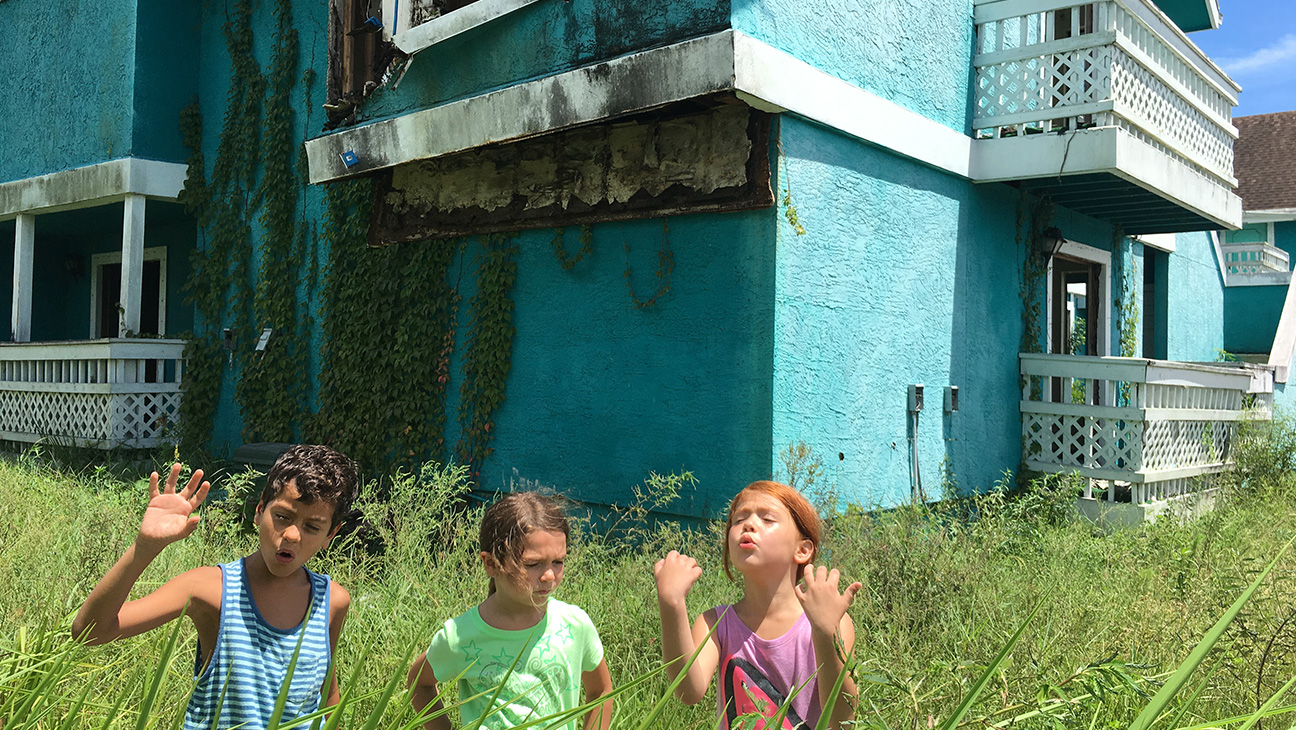
In The Florida Project, Baker holds fast to this child’s perspective, telling a decidedly adult story of poverty on the margins through the gauzy, pastel filters of younger eyes. Like Andrea Arnold, whose films Baker’s sometimes recall, he prefers non-actors in key roles, and he found a force of nature in Prince. We follow this tornado of activity and conjured invention as she, Scooty, and their new friend Jancey (Valeria Cotto) cause trouble in and around their rent-by-the-week Orlando motel, while the adults — like Ashley, Moonee’s mom Halley (Bria Vinaite), and motel manager Bobby (Willem Dafoe) — go about their tedious adult business of not being children. (When Bobby shoos them out at one point, Moonee replies, “Whatever, you guys are boring anyway.”)
Those adventures all transpire in the shadow of Disney World, a seeming juxtaposition of the real and the artificial that The Florida Project relishes. Their lives are intertwined, doppelganger-like, with the Happiest Place On Earth, whether it’s the tour helicopters taking off and landing literally next door, the off-brand motels luring visitors with names suspiciously similar to their more upscale counterparts down the road, or the tourists who pass through, easy marks for a quick buck or a prank. (Halley will take Moonee along to sell wholesale perfume at a discount in parking lots; Moonee, a quick study, will tell her new friend that a local spot is “where we get free ice cream,” before marching up to a customer in line and asking if the grown-up will please buy the kids some ice cream. “We have asthma and the doctor says we need ice cream,” Scooty adds earnestly.)
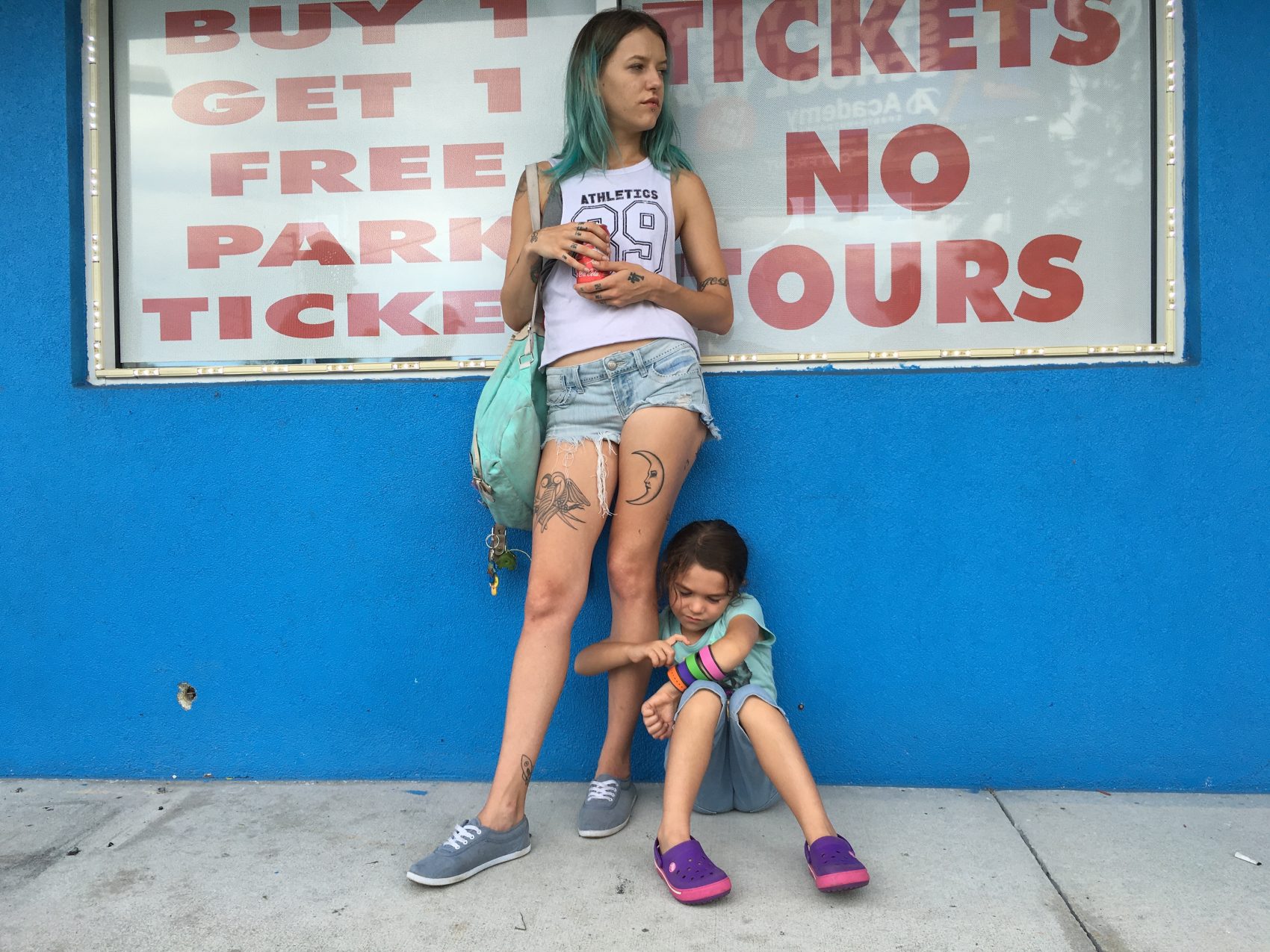
It won’t all be fun and games. From the start, Halley’s parenting tactics raise some questions, despite her fierce, beautiful love for Moonee, and small touches, like a creepy pedophile who Dafoe’s father-figure manager runs off the premises, hint at the dangers just outside the bubble of youthful glee in which The Florida Project mostly resides.
Like in Arnold’s Fish Tank, or Baker’s own 2012 Starlet, there’s the sense of a reckoning coming, that the center won’t hold, that infuses even the smallest moments with both fondness and something like dread. It’s both a childhood dread — that the summer will end, that the anxiety of 1st grade, where the only fun thing is recess, will have to be confronted — and a particularly adult one, a nostalgia tinged with genuine concern for these kids and their futures.
Baker’s previous film, 2015’s revelatory Tangerine, drew so much attention (including from this very site) for the novelty of its custom-lensed iPhone aesthetic that it’s easy to forget how driven it was by a deep and morally serious empathy. The Florida Project goes the opposite direction in one sense, dropping iPhones for 35 mm, while completely retaining that sympathy and emotional rigor. Baker presents flawed characters making dubious decisions for understandable reasons, and he does so not only without judgment but with abiding affection. It’s a tough line to walk, and you almost don’t notice the degree to which he pulls it off until the credits come up.
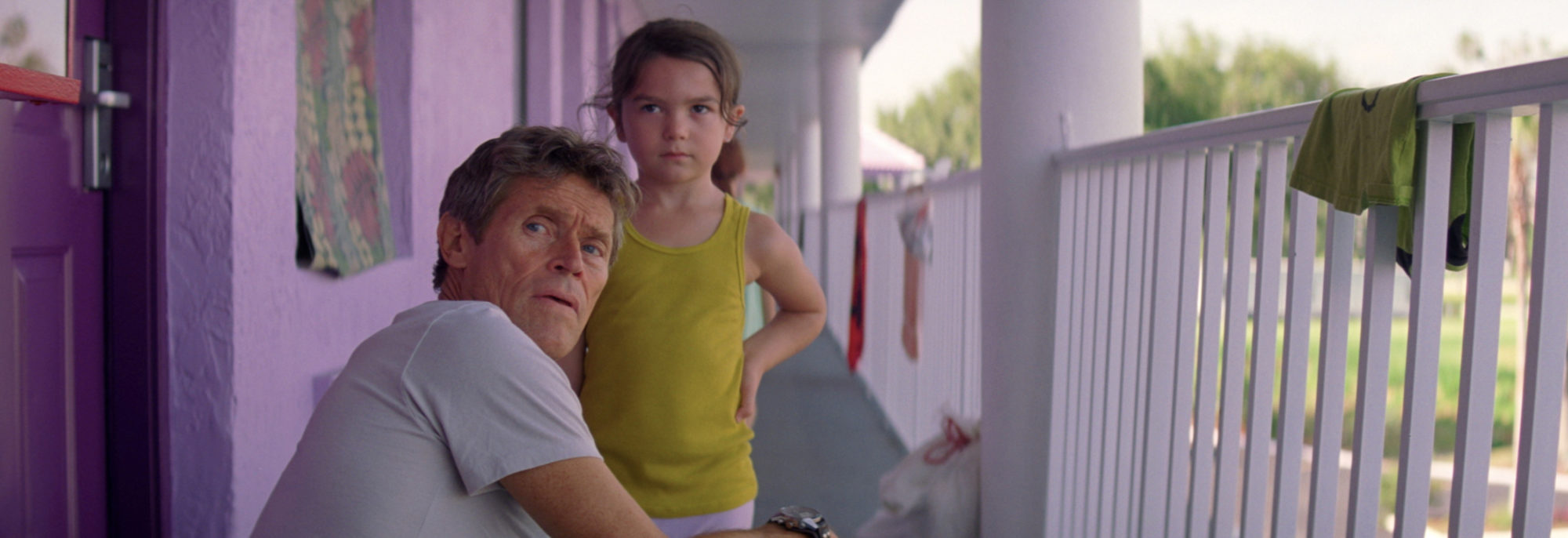
All the performances are stand-outs. Prince will get awards consideration for this, and she should. Her performance is at least as worthy as any other child actor’s that’s been nominated for an Oscar, in any case. Vinaite inhabits both Halley’s virtues and vices so fully she seems like she’s playing herself. Dafoe, the cast veteran, delivers a master class in restraint; watching him modulate his gruff exterior, a requirement in a job that involves kicking people out of their short- and not-so-short-term homes, while struggling to mask his protective affection for the kids (and their parents) who tease and madden him is, again and again throughout The Florida Project, a thing of wonder. He’s quite simply one of the best we’ve got.
The way Baker and his long-time co-writer Chris Bergoch construct Dafoe’s Bobby is yet another great example of their dramatic tact. A lesser film would’ve underlined Bobby’s back-story; in The Florida Project, we get only the barest hint, and it’s plenty. The screenwriting gives the sense of something that has been hacked away at, extraneous narrative details expertly removed because we just don’t need them.
We understand these people because of what they do, where they live, what they say, even how they hold their bodies. The kids, especially Moonee, deliver wonderfully real physical performances, contorting their arms in funny ways, kicking at nothing in particular, spontaneously dancing to a song they just remembered, slumping their shoulders in boredom.
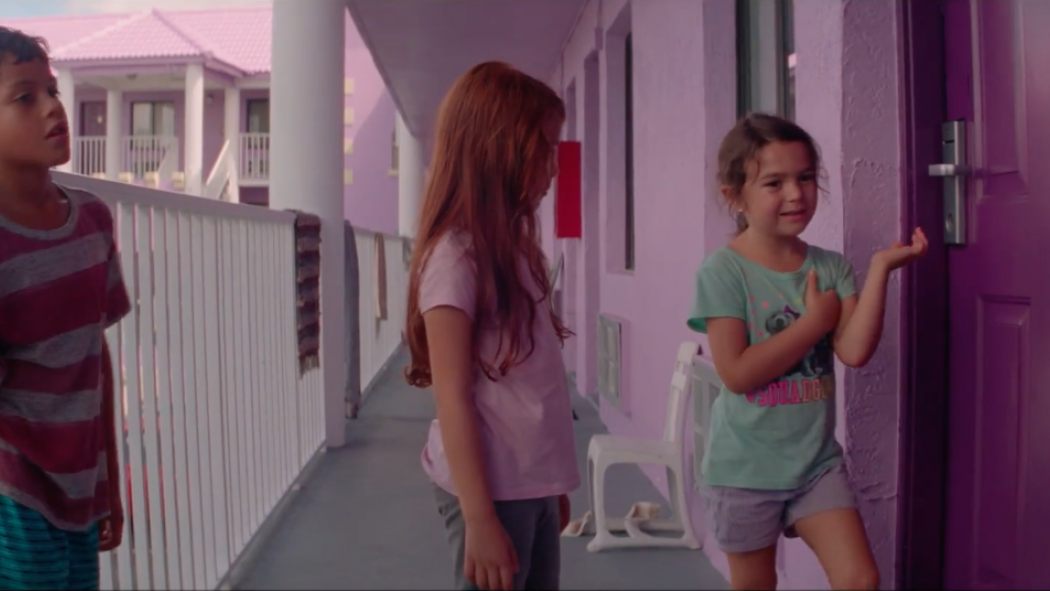
For a film that transpires over the course of a few weeks and, until its drama-packed third act, basically spends its running time according to the kids’ lazy clock, there’s a lot to discuss about The Florida Project. The contrasts between the frivolous artificiality of Disney and all-too-real poverty are prominent but also obscured; everything seems somewhat artificial here, from Bobby’s new coat of purple on the motel to the discount businesses actively blurring the lines between themselves and the “official” ones they are mimicking.
Jancey lives in “Futureland” (not to be confused with what Jancey’s mom refers to simply as “the purple place”), complete with a no-budget sign straight from the 1950s. It’s a weird material juxtaposition that ends up seeming out of time entirely, a vintage future. And Baker films on real locations, edits things down naturalistically while deploying frequently Altman-esque overlap in the sound, emphasizes documented social marginalization, coaxes painfully real performances from non-actors … all in the service of a cinema of the unreal. We walk by wizard-themed gift shops and listen in on meetings with social services; we play make-believe with actual tourist castles looming in the distance and then bear child-like witness to explosive, unexpected violence in rooms you can’t legally rent for more than a month at a time. The Florida Project is interested in both poles, and all the spaces in between.
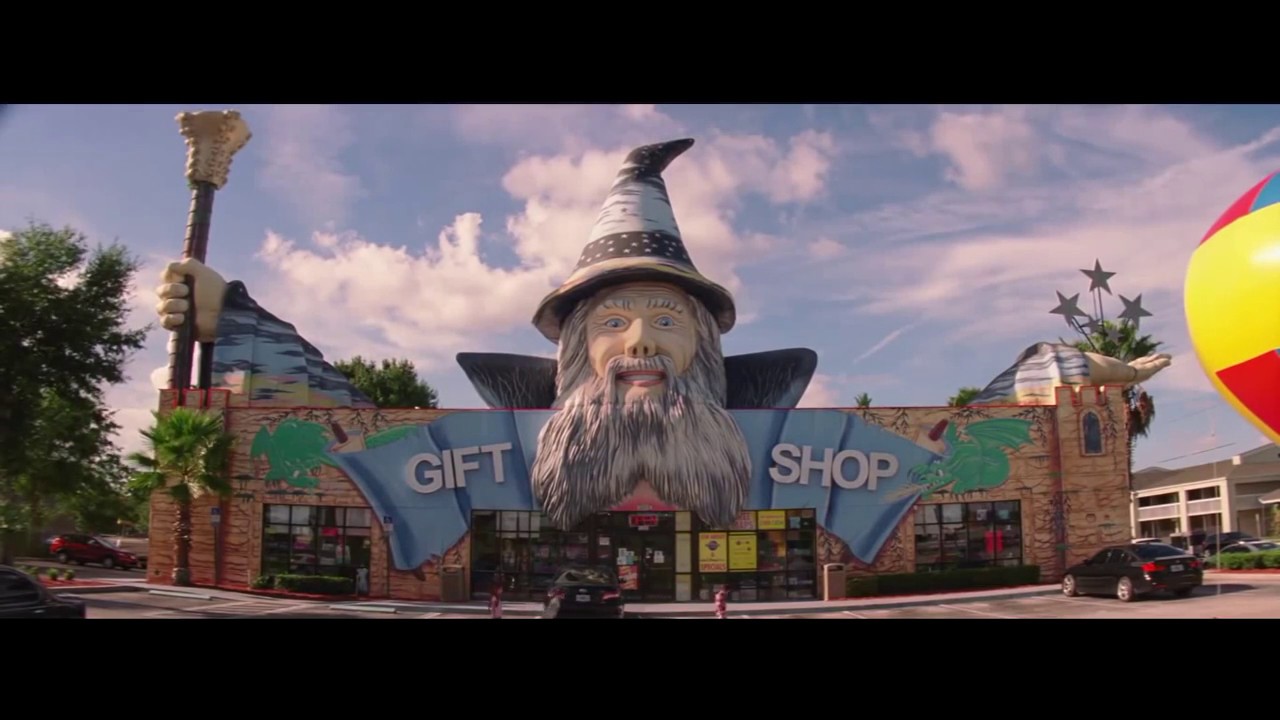
The film’s title alludes to Walt Disney’s working name for the theme park. “The Florida Project” was not intended to be an East Coast companion to its Anaheim sister resort, but rather a planned community, something of a utopian endeavor, a “test bed for new city living innovations.” He died before realizing this rather ambitious, and odd, dream, and then capitalism went to work, as is its wont.
Halley, Ashley, Moonee, Scooty, Jancey, and Bobby could all report back on how that’s worked out. But Baker’s film never labors the point. The Florida Project is well aware of the perils of fantasy, but — closing with a frantic race, surreptitiously shot inside the theme park in the film’s only iPhone footage, and then, finally, a still shot of castle and endless sky — also knows we need our dreams. Summer isn’t going to last forever.

